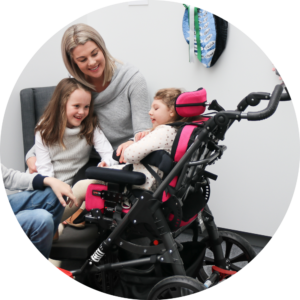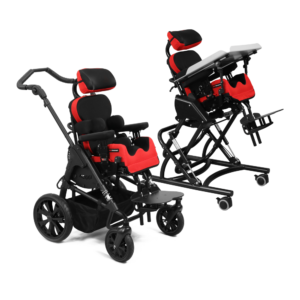Children develop skills as they grow. They roll over, begin to crawl, and learn to walk etc. however children that are affected with a physical disability are slower or may never achieve these skills. Early intervention applies to children from birth to school age who are discovered be at risk of developing a handicapping condition or other conditions that may affect their development. Early intervention consists in the provision of services for children and their families with the purpose of lessening the effects of the condition. Early intervention can be remedial or preventive in nature, remediating existing developmental problems or preventing their occurrence.
The Spex range of products suitable for very young children, gives the child the best start in life through proven early intervention. Appropriate seating equipment for young children with physical disabilities is imperative to provide an optimal seated position from which they may engage in functional activities. International research has verified the benefits of adaptive seating to include improved postural alignment, development of motor skills, helping the prevention of fixed deformity and facilitation of upper extremity function. It is vital to comprehend the seating principles that dictate the sitting postures of children and young people and the impact they have on long term health and function.

Posture is Paramount
We know that posture is so important for these children with physical disabilities and we want to meet the desires of the therapist and family so that the child’s sitting posture improves and develops. Seating the child early as possible in the BINGO Spex will help to maintain good postural management and prevent complications such as contractures and structural changes in the skeletal system while improving daily quality of life no matter how complex their disabilities. Children with moderate to severe physical disabilities such as cerebral palsy, spina bifida, muscular dystrophy and developmental delay etc. can benefit from these products’ ability to provide optimum pelvic stability, trunk/head alignment and good leg and foot positioning.
- Delivers an optimal seated position so the child can engage in functional activities.
- Provides specific fine-tuned seating requirements for a perfect setup for the individual user.
- Observes internationally recognised clinical and therapeutic practices for disabled or handicapped children.
- Provides quality postural management with modular accessories that can be added and removed depending on specific needs.
- Ability to be ‘planar’ or ‘complex’ depending on user needs.
Introducing the BINGO Spex – an innovative masterpiece and breakthrough in rehabilitative stroller seating. Spex clinical seating technology as developed originally for wheelchairs, has been designed to suit one of the world’s leading rehabilitation strollers, the BINGO OT. This has been carefully developed so therapists can now provide more comfort and superior positioning for young children with complex seating needs with the freedom of a stroller rather than a wheelchair. The adjustability of both the seating and stroller systems provides the maximum benefits for children with complex requirements.
seating technology as developed originally for wheelchairs, has been designed to suit one of the world’s leading rehabilitation strollers, the BINGO OT. This has been carefully developed so therapists can now provide more comfort and superior positioning for young children with complex seating needs with the freedom of a stroller rather than a wheelchair. The adjustability of both the seating and stroller systems provides the maximum benefits for children with complex requirements.
The seat unit is removable for ease of transport and travelling and can be used with an indoor Cobra Base option.
Age of user:
Size 1: 2 to 5 years
Size 2: 3 to 7 years






